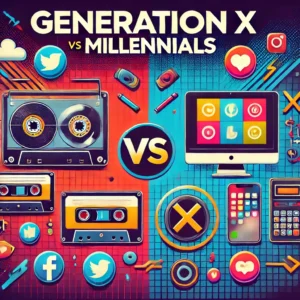No products in the cart.
Life Style
Gen Z Years: Everything You Need to Know About This Unique Generation
Who exactly is Generation Z, and what makes them so unique? If you’ve been curious about this fascinating generation, often described as tech-savvy, socially conscious, and adaptable, you’re in the right place. Let’s dive into the details of Gen Z years, their defining traits, and how they’re shaping the world.
What Are the Gen Z Years?
Gen Z, also known as Generation Z or “Zoomers,” refers to individuals born roughly between 1997 and 2012. However, these dates can vary slightly depending on the source. This generation follows Millennials (born 1981–1996) and precedes Generation Alpha (born 2013–present).
In a nutshell, Generation Z grew up during a time of rapid technological advancement, social change, and increasing globalization. They are often seen as digital natives who have never known a world without smartphones, high-speed internet, and social media.
Growing Up in the Digital Age
One of the defining characteristics of Generation Z is their deep connection to technology. Unlike Millennials, who witnessed the rise of the internet and social media as they grew up, Generation Z was born into a fully digital world. For them, smartphones, tablets, and Wi-Fi were just a given—not an innovation.
Social media platforms like Instagram, TikTok, and Snapchat are integral parts of their lives. Many Gen Zers use these platforms not only to stay connected but also to express themselves creatively, share their opinions, and even launch careers as influencers. Their fluency in the digital realm has made them incredibly adaptable to technological advancements.
Key Traits of Generation Z
So, what sets Generation Z apart from other generations? Here are some defining traits:
- Tech-Savvy: Gen Z’s comfort with technology goes beyond social media. They’re quick learners when it comes to new software, tools, and platforms. This has made them highly resourceful in both personal and professional settings.
- Socially Conscious: Social justice, environmental issues, and inclusivity are top priorities for Generation Z. They’re not afraid to speak up about causes they care about, and they’re willing to support brands and businesses that align with their values.
- Entrepreneurial: Thanks to platforms like YouTube, TikTok, and Shopify, many Gen Zers have embraced entrepreneurship. Whether it’s starting a small business, creating content, or monetizing their hobbies, they’re finding innovative ways to earn a living.
- Diverse and Inclusive: Gen Z is the most ethnically and culturally diverse generation in history. They’re also more open-minded and accepting of different lifestyles, identities, and perspectives.
- Mental Health Awareness: Unlike previous generations, Gen Z is vocal about mental health issues. They prioritize self-care, therapy, and open discussions about mental well-being. This generation is breaking down stigmas and advocating for better mental health resources.
Education and Learning Styles
Generation Z has grown up with information at their fingertips. Whether it’s Googling answers, watching educational YouTube videos, or taking online courses, they’re accustomed to learning on demand. Traditional classroom settings may feel restrictive to them, as they prefer interactive and tech-integrated approaches.
During the COVID-19 pandemic, Generation Z adapted quickly to remote learning, further proving their resilience and comfort with digital tools. As they continue to enter higher education and the workforce, their tech skills and ability to self-learn will undoubtedly set them apart.
Work and Career Aspirations
Gen Z’s approach to work differs significantly from previous generations. While Millennials are known for seeking purpose-driven jobs, Gen Z craves stability but also values flexibility and innovation. Here’s what’s important to them:
- Work-Life Balance: Gen Z prioritizes mental health and personal time. They’re unlikely to sacrifice their well-being for a job.
- Growth Opportunities: They value roles that allow them to develop new skills and advance their careers.
- Flexibility: Remote work and flexible hours are highly appealing to Gen Z, who are accustomed to working from anywhere.
- Ethical Employers: They’re drawn to companies that align with their values, especially when it comes to sustainability and social responsibility.
Gen Z vs Millennials
While Gen Z and Millennials share some similarities, there are notable differences. For example:
- Technology Use: Millennials witnessed the transition from analog to digital, while Gen Z was born into the digital age. As a result, Gen Z is more fluent in technology.
- Communication: Millennials often prefer text-based communication, like emails and messaging apps. Gen Z, however, embraces short-form content and visuals (think TikTok videos and memes).
- Career Goals: Millennials tend to seek meaningful, purpose-driven careers, while Gen Z values stability and flexibility alongside purpose.
The Challenges They Face
Despite their strengths, Generation Z faces unique challenges:
- Economic Uncertainty: Many Gen Zers are entering adulthood during a time of rising living costs and economic instability. This has led to concerns about financial security and home ownership.
- Mental Health Struggles: While they’re proactive about mental health, the pressures of social media, academic competition, and global issues have taken a toll on Gen Z’s mental well-being.
- Climate Anxiety: Gen Z is deeply concerned about environmental issues and the future of the planet. Many feel a sense of urgency to address climate change, which can be both motivating and overwhelming.
The Impact of Gen Z
Despite their young age, Gen Z is already making waves in society. From influencing consumer trends to reshaping workplace culture, their impact is undeniable. Here are some ways they’re shaping the future:
- Redefining Media: Gen Z’s preference for short-form, authentic content is influencing how brands and creators approach marketing.
- Driving Social Change: They’re using their voices and platforms to advocate for equality, justice, and environmental protection.
- Innovating Industries: Their entrepreneurial spirit is leading to new businesses, products, and solutions.
Why Understanding Gen Z Matters
Whether you’re a marketer, employer, educator, or simply curious, understanding Gen Z is essential. Their habits and values are shaping the future, and their influence will only grow as they become the dominant demographic in the workforce and marketplace.
Final Thoughts
The Gen Z years—1997 to 2012—represent a generation that’s truly unique. They’re digital natives, socially conscious, and full of potential. While they face their own set of challenges, their resilience and adaptability are inspiring.
As we continue to navigate a rapidly changing world, Gen Z’s influence will be felt in every corner of society. Whether you’re part of this generation or simply fascinated by it, there’s no denying that Gen Z is shaping the future in exciting and meaningful ways.






